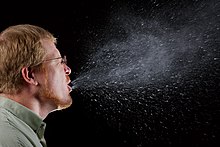Suzieq
Veteran Member
*By Elise Viebeck - 10/07/14 04:32 PM EDT
The Ebola virus becoming airborne is a possible but unlikely outcome in the current epidemic, Centers for Disease Control and Prevention (CDC) Director Tom Frieden said Tuesday.
The outbreak involves Ebola Zaire, a strain that is passed through bodily fluids, not the air. But some experts have expressed fear about viral mutations due to the unprecedented — and rising — number of Ebola cases.
Frieden sought to allay those fears during a call with reporters.
"The rate of change [with Ebola] is slower than most viruses, and most viruses don't change how they spread," he said. Frieden is unofficially spearheading the U.S. response to Ebola.
"That is not to say it's impossible that it could change [to become airborne]," he continued. "That would be the worst-case scenario. We would know that by looking at ... what is happening in Africa. That is why we have scientists from the CDC on the ground tracking that."
A change in the way Ebola spreads would make the virus significantly more dangerous. The disease kills roughly half the people it infects, and lacking a vaccine or cure, its traceable chain of transmission through bodily fluids is one reason officials believe they can contain it.
Still, there is almost no precedent for a human virus mutating to become transmissible in a different way, a key piece of evidence in weighing whether that kind of shift is likely for Ebola.
"We have so many problems with Ebola, let’s not make another one that, of course, is theoretically possible but is pretty way down on the list of likely issues," infectious diseases expert William Schaffner of Vanderbilt University told Scientific American.
Frieden touted new progress against Ebola in West Africa and Dallas, where a Liberian man remains in critical condition, but warned that "globally, this is going to be a long, hard fight."
The Dallas patient interacted with 10 definite and 38 possible interlocturos who are now being monitored, he said. None have shown symptoms.
*(Fair Use)
Resource: http://thehill.com/policy/healthcare/220046-cdc-airborne-ebola-possible-but-unlikely
The Ebola virus becoming airborne is a possible but unlikely outcome in the current epidemic, Centers for Disease Control and Prevention (CDC) Director Tom Frieden said Tuesday.
The outbreak involves Ebola Zaire, a strain that is passed through bodily fluids, not the air. But some experts have expressed fear about viral mutations due to the unprecedented — and rising — number of Ebola cases.
Frieden sought to allay those fears during a call with reporters.
"The rate of change [with Ebola] is slower than most viruses, and most viruses don't change how they spread," he said. Frieden is unofficially spearheading the U.S. response to Ebola.
"That is not to say it's impossible that it could change [to become airborne]," he continued. "That would be the worst-case scenario. We would know that by looking at ... what is happening in Africa. That is why we have scientists from the CDC on the ground tracking that."
A change in the way Ebola spreads would make the virus significantly more dangerous. The disease kills roughly half the people it infects, and lacking a vaccine or cure, its traceable chain of transmission through bodily fluids is one reason officials believe they can contain it.
Still, there is almost no precedent for a human virus mutating to become transmissible in a different way, a key piece of evidence in weighing whether that kind of shift is likely for Ebola.
"We have so many problems with Ebola, let’s not make another one that, of course, is theoretically possible but is pretty way down on the list of likely issues," infectious diseases expert William Schaffner of Vanderbilt University told Scientific American.
Frieden touted new progress against Ebola in West Africa and Dallas, where a Liberian man remains in critical condition, but warned that "globally, this is going to be a long, hard fight."
The Dallas patient interacted with 10 definite and 38 possible interlocturos who are now being monitored, he said. None have shown symptoms.
*(Fair Use)
Resource: http://thehill.com/policy/healthcare/220046-cdc-airborne-ebola-possible-but-unlikely

